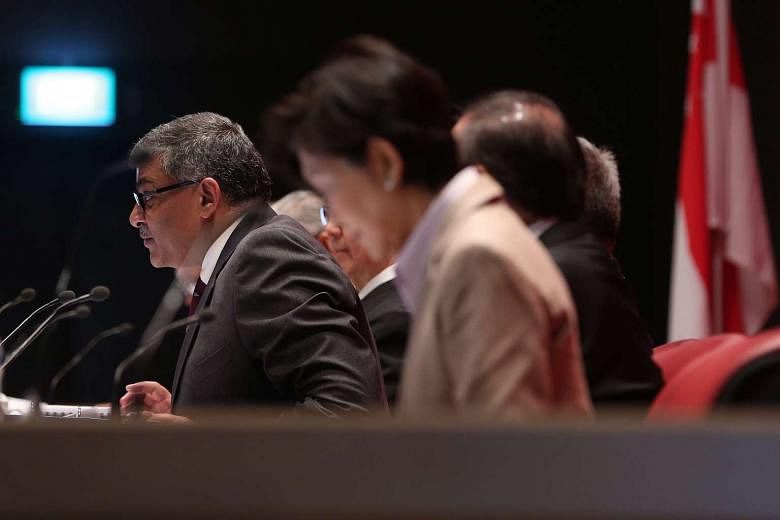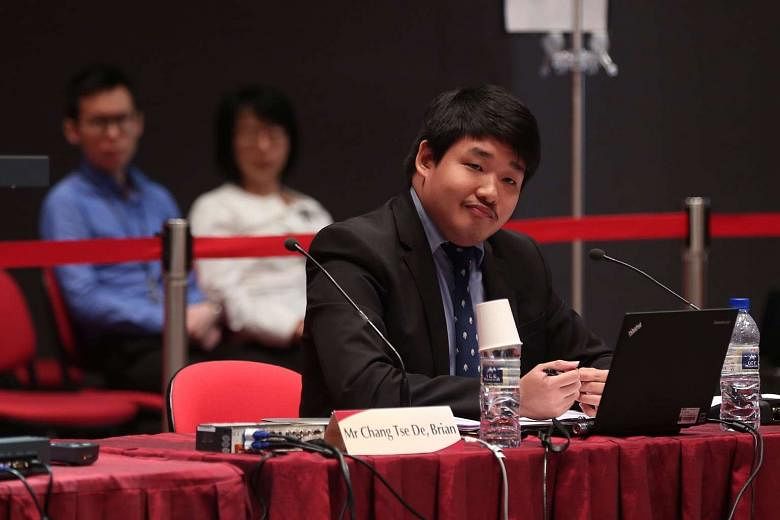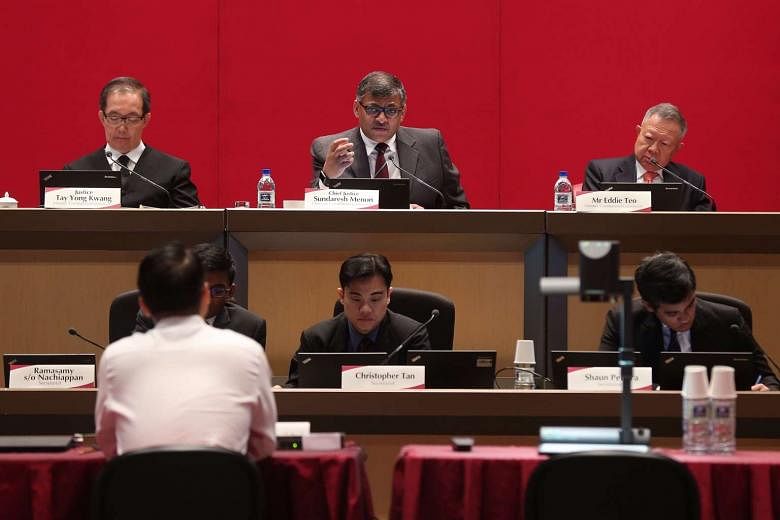SINGAPORE - The question of when proposed changes to the elected presidency should kick in was among the topics that came up for discussion on Monday (April 18) at a hearing held by the commission formed to review the elected presidency.
Singapore Management University law professor Eugene Tan, speaking at the hearing, said any changes should come into effect only after the next presidential election that is due in 2017.
He said "the process of putting in the changes matter as much as the changes itself", and implementing the changes later would prevent the presidential election from being unnecessarily politicised.
Prof Tan was among 19 individuals and groups invited to give their views at a series of hearings, which kicked off on Monday, held by the Constitutional Commission formed to review the Office of the President.
Human rights researcher Brian Chang and in-house legal officer Edwin Yeo also spoke in the morning session.
Also expected to speak later on Monday are Institute of Policy Studies senior research fellow Mathew Mathews, academic Loke Hoe Yeong from the European Union Centre in Singapore, and Association of Women for Action and Research (Aware).
Prof Tan was asked by the chairman of the commission, Chief Justice Sundaresh Menon, about the point on timing that he had included in his written submissions to the commission.
CJ Menon said: "Isn't that a political question for the Government to decide on?"
He added that the commission was tasked to study proposed changes to the elected presidency and to make recommendations on it, and the question of when the changes are to be put in place is not a matter for the commission to decide.
He also said that what should be done is to convey the sentiments to "those who have the responsibility to decide".
Prof Tan had said in his written submissions that "changing the rules of the game so late in the presidential electoral cycle would upset legitimate expectations... (and) unnecessarily politicise the election for a non-partisan office".
Professor Chan Heng Chee, chairman of the Lee Kuan Yew Centre for Innovative Cities at the Singapore University of Technology and Design, said such a delay would mean that the committee's recommendations would only be adopted almost half a decade after it submits its report.
"That's a long time," said Prof Chan who is one of the nine members in the commission.
To this, Prof Tan said that the Government had between 2011 and 2015 to review the elected presidency. Changing the criteria so late "brings an unnecessary political edge to the presidential election", given how the public might interpret the move, he added.
The timing of the reviews has been the subject of discussions by some pundits, with the next presidential election due by August 2017.
The impact of potential provisions to ensure a minority president on larger Singapore society was debated when it was Mr Chang's turn to speak.
Citing the example of Lebanon, he argued that some countries had systems reserving particular political positions for certain ethnicities, but ended up giving rise to race-based politics and political parties.
He added that if conditions should be made to ensure a minority to be president from time to time, it may lead to calls for the same thinking to be applied to other key offices such as the prime minister and speaker of parliament.
But CJ Menon pointed out that the office of the presidency is unique as the president is the "physical embodiment of the state", unlike other officials. Hence, it might merit special consideration that does not apply to other institutions.
"This slippery slope argument may be more frightening than it needs to be," CJ Menon said.
In his written submission, Mr Chang suggested that two candidates, with at least one of them a minority, run on the same ticket.
To ensure a minority candidate who is qualified to be president can rise to the office, Mr Yeo suggested a hybrid system that combines aspects of appointing and electing a president.
He proposed that a presidential council be set up to identify and vet one candidate in consultation with the prime minister. This candidate must then be approved by Parliament, following which he or she will face a nation-wide election where Singaporeans will vote on whether they want the candidate as president.
The council will ensure the candidate has the qualifications to carry out his or her duties. The candidate will also have a national mandate to fulfill his custodial role, Mr Yeo argued.
If Parliament withholds its approval of the candidate fails to garner a majority in the "yes" or "no" national election, the process is repeated.
Mr Yeo said this system avoids the divisiveness of putting candidates against one another, which he said happened in the 2011 presidential election. Such a mechanism also allows minority candidates to be put up for approval by the electorate from time to time.
Former presidential hopeful and opposition politician Tan Jee Say, who contested in the 2011 presidential election, was among several members of the public who attended the hearing.
Former politician Tan Cheng Bock, who also contested the last presidential election, has said he intends to run in the next one. Several of his supporters, in comments on social media, have asked if the review is an attempt to disqualify him from running for president.
Among those invited, only the Workers' Party declined to participate. It had called for presidential elections to be abolished in its written submission and said its MPs will speak about the issue in Parliament.
The next public hearings will be held at the Supreme Court auditorium on Friday, April 26 and May 6.
Those attending must be properly dressed, and should not wear singlets, shorts, bermudas, slippers or any clothing with controversial messages. Photo, video and audio recordings are also not allowed.











